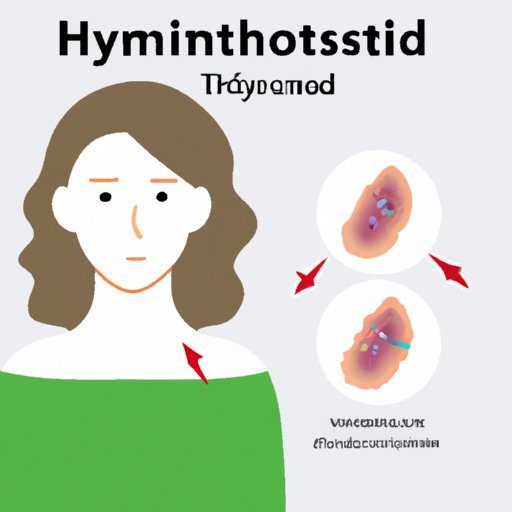
Introduction
Hashimoto’s disease is an autoimmune condition that affects the thyroid gland, which is responsible for regulating a person’s metabolism, growth, and development. This disease is also known as chronic lymphocytic thyroiditis or autoimmune thyroiditis. Hashimoto’s is the most common cause of hypothyroidism in the United States, affecting approximately 5% of the population. In this article, we aim to provide a comprehensive understanding of the severity of Hashimoto’s disease, debunk common myths, and offer strategies for living with the challenges of managing this condition.
The Invisible Hand: Understanding the Severity of Hashimoto’s Disease
Hashimoto’s disease can occur at varying levels of severity. In some cases, it may cause only mild symptoms and require little or no treatment, while in others, it may lead to thyroid failure. The severity of the disease depends on the extent of damage to the thyroid gland and the level of antibodies in the blood.
If left untreated or poorly managed, Hashimoto’s disease can cause long-term damage to the thyroid gland, leading to hypothyroidism. Symptoms of hypothyroidism include fatigue, weight gain, depression, constipation, and cold intolerance. In severe cases, hypothyroidism can lead to myxedema coma, a life-threatening condition that requires immediate medical attention.
It is essential to monitor and treat Hashimoto’s disease properly, as it can have a significant impact on a person’s overall health and well-being. Treatment usually involves hormone replacement therapy to increase thyroid hormone levels and prevent or manage hypothyroidism. Regular monitoring of thyroid function is necessary to adjust the dosage of medication as needed.
Debunking the Myths About Hashimoto’s Disease: A Comprehensive Look at This Autoimmune Condition
There are common misconceptions about Hashimoto’s disease that contribute to underestimating the severity of the condition. One of the most significant myths is that it only affects older women. In reality, Hashimoto’s disease can affect anyone, regardless of age or gender.
Another common myth is that stress causes Hashimoto’s disease. While stress can exacerbate symptoms in some cases, it is not a direct cause of the disease. Hashimoto’s is an autoimmune condition, which means the body’s immune system mistakenly attacks and damages the thyroid gland.
People with Hashimoto’s disease may also be told that their symptoms are “all in their head” or dismissed as simply feeling tired. These myths and misconceptions can lead to delayed diagnosis and treatment of the disease.
It is essential to counteract these myths with evidence-based information to increase awareness of the severity of Hashimoto’s disease. People with Hashimoto’s disease should not feel shame or stigma around their condition. Instead, they should receive the proper support and treatment they need.
Hashimoto’s Disease: A Silent Killer of the Thyroid Gland
Hashimoto’s disease can progress silently over time, causing significant damage to the thyroid gland without noticeable symptoms. This damage can lead to a range of health risks and complications, including goiter, nodules, and thyroid cancer.
Early detection and treatment are crucial to prevent irreversible damage to the thyroid gland. Regular monitoring of thyroid function and antibody levels can help detect Hashimoto’s disease and prevent its progression.
For people with Hashimoto’s disease, it is important to work with a healthcare professional who specializes in thyroid conditions and can provide ongoing care and monitoring.
Breaking Down the Symptoms and Risks of Hashimoto’s Disease
Hashimoto’s disease can cause a range of physical and emotional symptoms, including fatigue, weight gain, depression, and anxiety. These symptoms can significantly impact a person’s quality of life and daily functioning.
In addition to physical symptoms, Hashimoto’s disease also poses several significant health risks. These risks can include heart disease, infertility, and miscarriage. It is crucial to manage Hashimoto’s disease well to prevent or manage these health risks effectively.
Living With Hashimoto’s Disease: Understanding the Challenges and Finding Hope
Living with Hashimoto’s disease can be challenging, both physically and emotionally. People with Hashimoto’s disease might face stigma or misconceptions about their condition, and they may feel isolated or unsupported.
It is important to know that there are resources and support available for people with Hashimoto’s disease. Joining support groups or connecting with other people facing similar challenges can be an excellent way to find comfort and community.
Coping strategies can include maintaining a healthy lifestyle, getting regular exercise, and seeking emotional support from loved ones or a mental health professional. Approaching disease management with a positive and proactive attitude can help people with Hashimoto’s disease feel more in control and find hope for the future.
Conclusion
In conclusion, Hashimoto’s disease is a serious autoimmune condition that can have a significant impact on a person’s overall health and quality of life. By understanding the severity of the disease, debunking common myths, and embracing strategies for living with the challenges of managing this condition, people with Hashimoto’s disease can find hope and support. With ongoing research and developments in treatment options, there is reason to be optimistic about the future for people with Hashimoto’s disease.
Image Source: https://www.pexels.





